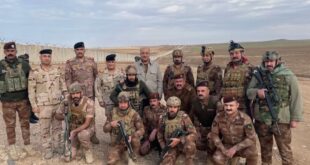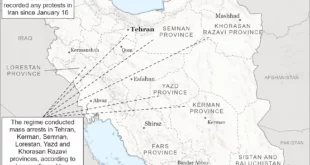A long-awaited National Intelligence Estimate on Iraq, presented to President Bush by the intelligence community yesterday, outlines an increasingly perilous situation in which the United States has little control and there is a strong possibility of further deterioration, according to sources familiar with the document.
In a discussion of whether Iraq has reached a state of civil war, the 90-page classified NIE comes to no conclusion and holds out prospects of improvement. But it couches glimmers of optimism in deep uncertainty about whether the Iraqi leaders will be able to transcend sectarian interests and fight against extremists, establish effective national institutions and end rampant corruption.
The document emphasizes that although al-Qaeda activities in Iraq remain a problem, they have been surpassed by Iraqi-on-Iraqi violence as the primary source of conflict and the most immediate threat to U.S. goals. Iran, which the administration has charged with supplying and directing Iraqi extremists, is mentioned but is not a focus.
Completion of the estimate, which projects events in Iraq over the next 18 months, comes amid intensifying debate and skepticism on Capitol Hill about the administration’s war policy. In a series of contentious hearings over the past two weeks, legislators have sharply questioned Bush’s new plan for the deployment of 21,500 additional U.S. troops and the administration’s dependence on the government of Iraqi Prime Minister Nouri al-Maliki.
In acid remarks yesterday to Gen. George W. Casey Jr., the departing U.S. commander in Iraq, Sen. John McCain (R-Ariz.) noted that “things have gotten markedly and progressively worse” during Casey’s 2 1/2 -year tenure, “and the situation in Iraq can now best be described as dire and deteriorating. I regret that our window of opportunity to reverse momentum may be closing.” Casey was appearing before the Senate Armed Services Committee on his nomination to be Army chief of staff.
Although McCain supports the additional troop deployments, he has proposed a Senate resolution including stringent benchmarks to gauge the progress of the Iraqi government and military. McCain’s resolution and other nonbinding, bipartisan proposals that would express varying degrees of disapproval of Bush’s plan will be debated on the Senate floor next week.
Legislators have been equally critical of the intelligence community, repeatedly recalling that most of the key judgments in the October 2002 NIE on Iraq’s weapons of mass destruction were wrong. That assessment concluded that Saddam Hussein had amassed chemical and biological weapons and was “reconstituting” his nuclear weapons program. It became the foundation of the Bush administration’s case — and congressional authorization — for invading Iraq.
“One of the sort of deeply held rumors around here is that the intelligence community gives an administration or a president what he wants by way of intelligence,” Sen. Dianne Feinstein (D-Calif.) told Navy Vice Adm. John M. McConnell, Bush’s nominee to be director of national intelligence, during McConnell’s confirmation hearing yesterday.
Without directly accepting Feinstein’s premise, McConnell replied that the intelligence community had learned “meaningful” lessons over the past several years and that “there’s very intense focus on independence.” McConnell and others made clear that the new NIE on Iraq had been subjected to extensive competitive analysis to test its conclusions.
One senior congressional aide said the NIE had been described to him as “unpleasant but very detailed.” A source familiar with its language said it contained several dissents that are prominently displayed so that policymakers understand any disagreements within the intelligence community — a significant change from the 2002 document, which listed most key dissents in small-type footnotes.
Sen. Christopher S. Bond (R-Mo.), vice chairman of the Senate intelligence committee, pointedly told McConnell that “we are not going to accept national security issue judgment[s] without examining the intelligence underlying the judgments, and I believe this committee has an obligation to perform due diligence on such important documents.” Previous committee attempts to obtain material to back up a 2005 NIE on Iran, Bond said, had “run into resistance.”
The outgoing director of national intelligence, John D. Negroponte, briefed the president on the Iraq NIE yesterday, and the document will be made available to Congress early today. A two-page declassified version of its key judgments will then be posted on the DNI Web site.
Sources familiar with the closely held estimate agreed to discuss it in general terms yesterday on the condition that they remain anonymous and not be directly quoted. But Negroponte and others in the intelligence community have made frequent references to its conclusions in recent testimony.
On Tuesday, Negroponte referred to the NIE in testimony before the Senate Foreign Relations Committee. “Iraq is at a precarious juncture. That means the situation could deteriorate, but there are prospects for increasing stability” that depend on the commitment of Iraqi government and political leaders to take steps to end Sunni-Shiite violence and “the willingness of Iraqi security forces to pursue extremist elements of all kinds,” he said.
Congress, which requested the Iraq NIE last August, has pressured the intelligence community to complete it in time for consideration of Bush’s new strategy. Intelligence officials have insisted that their best experts were working on the project at the same time they were meeting the demands of policymakers for current intelligence reports.
NIEs comprise input from across the community and are written by the National Intelligence Council.
Š
 Eurasia Press & News
Eurasia Press & News



